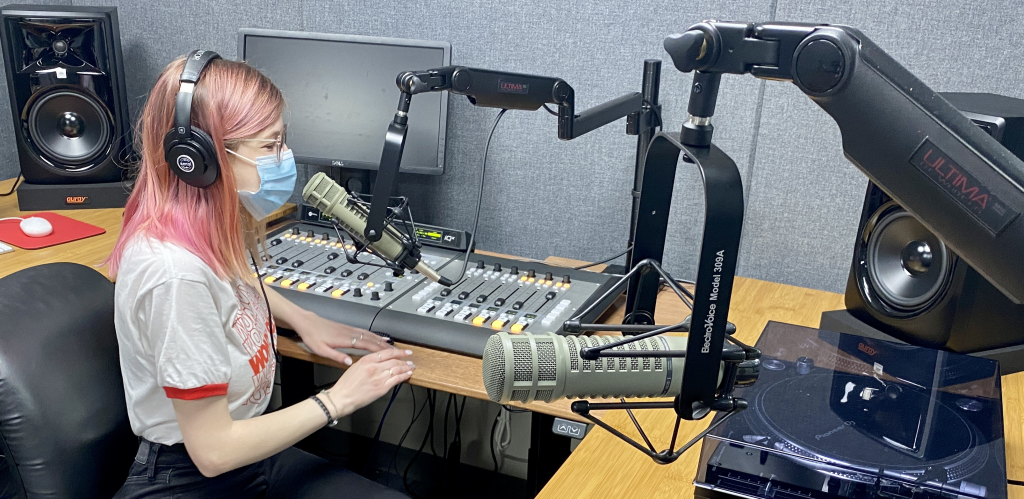
This year, WONY 90.9 FM, the student-run radio station of the State University of New York at Oneonta (SUNY Oneonta), is marking its 60th Anniversary, an accomplishment attributable both to the university’s unfailing six-decades of support and to the enthusiasm that support engenders in each new class of student volunteers who assume full responsibility for running the station.
This milestone will be particularly sweet. The student staff is now operating at full force for the first time in two years, finally back on campus after COVID closings and restrictions, and they will be working for the first time in a newly built, modernized studio.
On October 26, I spoke with Dr. Andrew Bottomley, Associate Professor of Media Studies in the Media and Communication Department at SUNY Oneonta and, since 2016, Faculty Advisor to WONY. His recent book Sound Streams: A Cultural History of Radio-Internet Convergence traces the beginnings of streaming audio and podcasting through the 1990’s and 2000’s.
We spoke about the university’s program, about the student station management structure, and about the significance of the station to the local community.
This interview has been edited for brevity and structure.
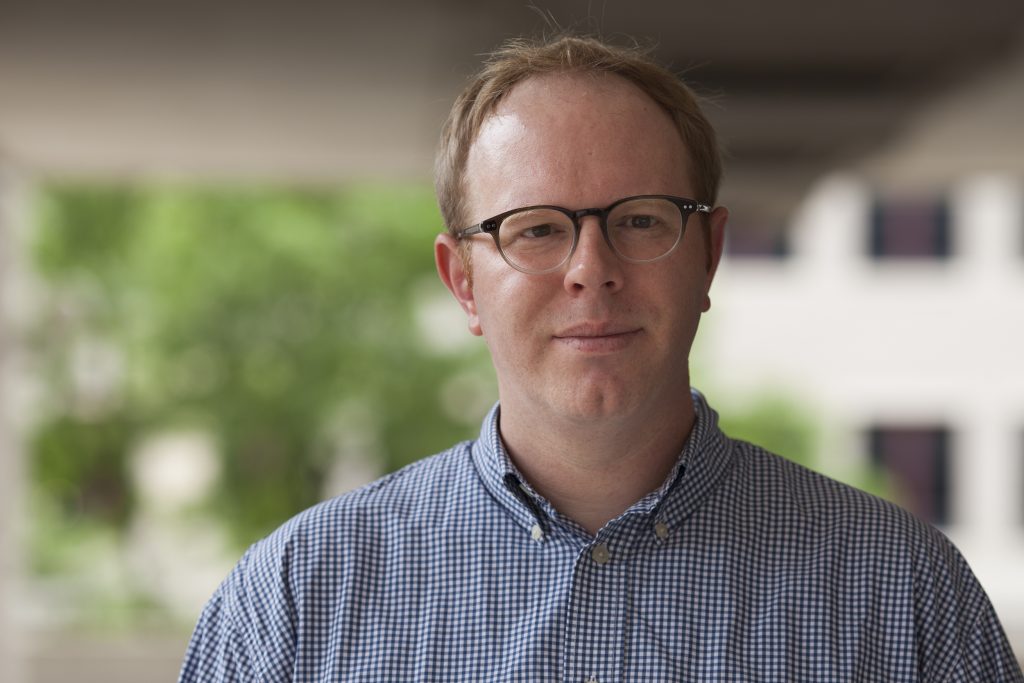
Diane: First, of course, congratulations on the station’s 60th Anniversary. That’s an accomplishment for any station and a particular kind of accomplishment for a college station. I guess, then, I’d like to start by hearing about the college’s commitment to the station and that probably best means starting with you and your work.
Andrew: I earned my PhD in Media and Cultural Studies from the University of Wisconsin Madison. I studied the cultural history of broadcasting. My research was primarily on sound media, particularly radio, and I write about and teach about radio and podcasting.
As a graduate student, I was involved with WSUM, the University of Wisconsin Madison student-run station. I was always a music person. It was a way I could get on the air, an hour every week, and it was an excuse for me to stay up on new music. It was a real education into how a college radio station could or maybe should run, very professional but, at the same time, very student directed and a great platform for the students to learn and do whatever it was that they were interested in, to apply their passion and learn from one another. And so it was a really wonderful model.
Then, when I was on the job market, I ended up here, and, in one of those odd twists of fate, when I got hired, the [station] faculty advisor was retiring. Somebody who I worked with in the Communication Department recommended the students to me and I joined up. I would have been disappointed if I couldn’t have been the faculty advisor!
Diane: This is in addition to your teaching load, right?
Andrew: Yeah. I do it as service. I don’t receive any additional pay. I teach a full load of classes, and I am a tenured professor. I do the radio station because I love it and believe in the value of the station to the community….There’s obviously a lot of turnover amongst the student body, so in a way I’ve become the institutional memory now; I try to make sure that the station is something that continues to not just survive, but flourish, that we really can grow for another 60 years. That’s happening.
Diane: And you are all working now in a new studio.
Andrew: [When I started in 2016] the station was at a real transition point because they were getting kicked out of their old studios [where] they’d been since about 1980, due to that building being renovated. So, we built this whole new space [in the student union building] and it’s amazing, we were able to get nearly everything that we needed to bring the radio station into the future.
[It was] quite hands on working with the architects and the Facilities and Planning people on campus. We made sure that the students were actively involved in every step of the process, and really my job was to ensure that the students’ vision for the station was being seen through.
To the college’s credit, they were committed to continuing the radio station, and certainly you have some idea how tenuous campus radio stations can be. In this day and age, it would have been easy for the college to say, ‘Radio? Who cares about radio?’ and just defund them. The college administration understood how popular WONY is, and the rich history of WONY on this campus, and they included it in their rebuilding plan….And the alumni are amazing, very supportive. There’s a real tradition of doing college radio here on this campus. And that legacy sustains itself, year after year. The students change, but there’s always a really strong showing of support for the radio station.
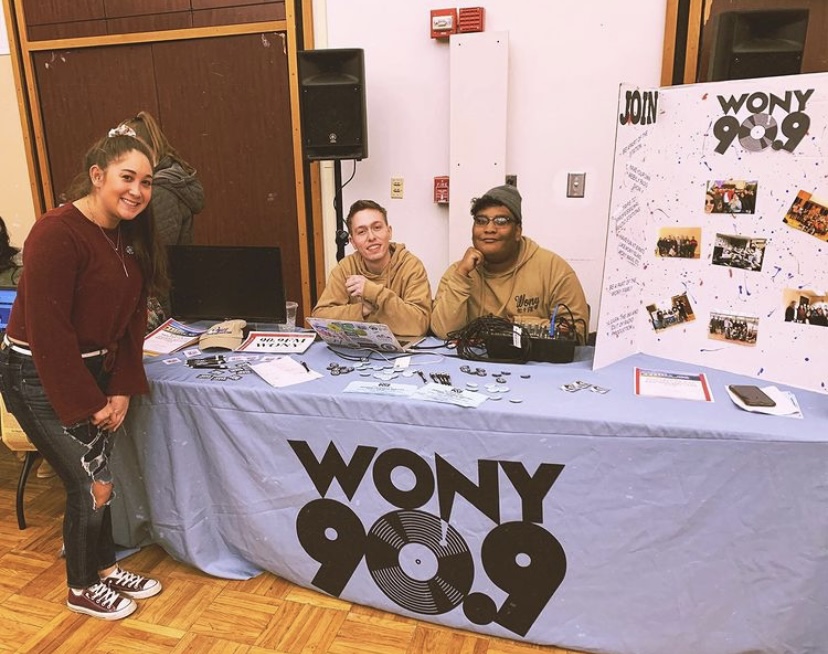
Diane: So, let’s move now to talk about the roles and responsibilities of the students. How do students get involved? How do students handle the day-to-day management of the station, of its programming?
Andrew: WONY, 90.9 FM, is fully student run. It’s a true campus radio station. It’s student run and operated; it’s set up on the campus as a student club. It’s housed under the Student Association, and the primary funding comes from the college through the Student Association, which is paid for by the student activity fees. And so it’s pretty independent in the sense that it’s not tied to a particular academic department or program on campus.
[Membership] is purely voluntary [and] self-directed….We [the university] have a Music Industry Program, so a lot of students come from [that] program. And then I teach Media Studies, and we have a lot of students who come from an interest in doing radio broadcasting or podcasting. But we also have a lot of students who are there because they’re simply curious about radio—they might be in education, or geography, or history—but they like the idea of having their own radio show as a hobby, or they found their way here because they have friends who are part of the station. It’s a true kind of community radio station in that way. Some members don’t even broadcast; they’ll help organize events, but they don’t actually host a show. Some students just want to be part of the club because it really is a nice, supportive atmosphere that forms around WONY naturally.
And, of course, a lot of students do want to have shows too, so it’s always a nice turnover in the types of programs that go out over the air, year to year, based on the interests of those individual students. Sometimes we’ll have more talk shows and sports, and other times it’ll be primarily music shows, but all genres. So it’s always nice to see how it evolves because the members are always shifting.
There is a 10-member student Executive Board, [including, for example] a General Manager, Programming Director, Public Relations, Operations Director, Music Director, Business Manager. These students are a core administrative unit, and they really do the majority of the work running the day-to-day operations. And that, of course, also includes recruiting new members, so they do various events on campus that keep WONY in the public mind. We definitely are one of the larger clubs on campus, in terms of membership.
[Board members] are elected from the general body. There are a few stipulations to being elected to an E-Board position, but the primary one is that you have a history of membership, that you’ve been a member in good standing. So that does mean that the E-Board [members] generally rise through the ranks.
They mostly self-manage. I’m there for oversight and to sign the checks, to maintain fiscal responsibility, to train the students. But they do run the majority of operations, particularly when it comes to programming and determining what’s on the air and who’s on the air. That’s all independently determined.
Diane: And I saw on the station website that you have a listing of shows to train on. How does that work?
Andrew: When new members come in, they have to do their hands-on training. They have to sit in on a few hours of existing shows, so the shows that are marked as training are those veteran members, the majority of which are on that Executive Board, so they’re in a leadership position within the station. The point is that they are someone who really knows how everything runs, and so they volunteer or they agree to be a trainer and have new members on their shows.
Diane: As a student-run station housed on campus, COVID closings and restrictions must have been difficult to manage. What was the impact of COVID on the station, on the school?
Andrew: WONY was running through COVID, but mostly on automation. So the radio station kept going, and the membership kept going, but we weren’t in person and there weren’t a lot of DJs on the air. But the students—in terms of having members and an Executive Board and maintaining camaraderie and a sense of WONYness—the students kept going, even when they didn’t really need to. I would have understood if during COVID they wanted to step back, [but] there were a lot of students who stayed with the club because of that community spirit.
Effectively, we were back in the Spring 2021 semester, at the beginning of the year in 2021. But things were kind of hybrid remote. There were social distancing restrictions on campus still, so a lot of students weren’t living back on campus full-time and live DJs were still somewhat restricted. That lasted for about a year. Then, in Spring 2022 our college went fully in-person again, though all of last year was a rebuilding year. It was a smaller number of people running the ship than we’ve ever had. 2022 was really about getting the membership back up, as well as re-training everyone. But we’re getting close to our pre-COVID numbers. [Usually] there’s around 40 to 50 active members. I’d say we’re probably about 30 to 40 students now. We also have a few community members that are not directly associated with the college who have shows.
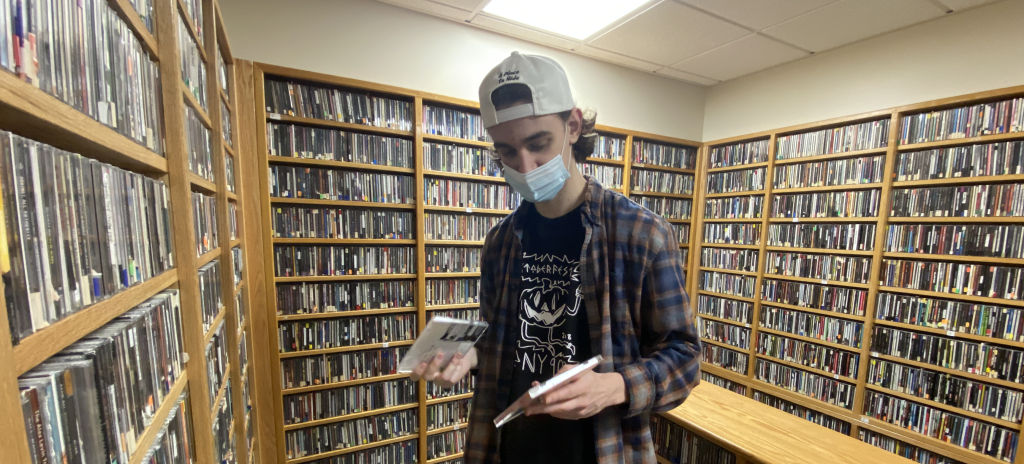
Diane: That opens the next questions I wanted to ask about the connections that exist between the station and the local community. Can you tell me a little about Oneonta?
Andrew: We’re in a rural area of central New York; we’re about an hour from everywhere—an hour east of Binghamton, an hour west-southwest of Albany, an hour south of Utica. The college is a huge employer in the region. There’s [also] a smaller college called Hartwick College nearby. There are a number of manufacturing companies, aerospace and other small industries. There’s a Corning plant here. But, once you get in town, many things are attached to the college, lots of restaurants and shopping, a lot of retail. Then, once you go just outside our borders, it’s primarily agricultural. To the south of us is the Catskill Mountains, so you’ve got tourism but also a lot of farming, dairy farms. And to the north it’s more traditional, crop-based agriculture and apple orchards. Cooperstown is just about 20 minutes north of us, with the National Baseball Hall of Fame, so there’s tourism and summer industry built up around that, summer baseball camps.
Diane: And so, what is, has been WONY’s role in the community?
Oneonta in this region is a bigger population center and in its way is a media center, although there are only a couple dozen radio stations that you can get reception for in this area, and the majority of those are commercial conglomerate stations. Most of the public stations are translators from other bigger population centers [like WSKG in Binghamton or WAMC in Albany]; and so WONY, being an actual community-run public radio station, really has an opportunity to provide something unique to the community.
You know, sometimes half the battle is reminding young people who do everything on their phones that radio is still a thing, right? But, [because] we’re in a pretty rural area, radio actually does reach a lot of people who don’t have good internet connections. People who live here do listen to the station and know the station. And we, as a community radio station, play a real role in connecting the campus but also in connecting the campus to the community.
We’re now adopting a number of new ideas. like affiliating with Pacifica, to try to rebuild the programming and rebuild our standing in the community. COVID really separated people. We were moving to a new building. And we’re trying now to rediscover what WONY can do for the local area here. I feel like WONY’s identity was ready for a change. We’re redefining now what the role of the radio station is on the campus and in the community.
We have been trying to do more and more outreach over the years, whether it’s just going into town and connecting with local businesses to get underwriting or doing events with the community. Pre-COVID, for a year or two, we would DJ, do a live broadcast, for the farmers market. We try to cover some community events. I’ve been working with students to do podcasts, audio documentaries and news pieces, where they’re actually going out into the community. I think that’s a good way of building up the connection, that shows people that there is value here from a listener’s perspective. that we’re providing information that they really are not going to get anywhere else. We’re definitely in a little bit of a news desert here in central New York. We have one small local newspaper and a couple of websites that do news, but it’s mostly all recycled press releases. There’s not a lot of actual original reporting being done.
And so WONY can provide some of that content to the local community. We have a great Production Director this year, and she’s doing more current weekly news stories and reports that get played every hour, longer form programming where they bring in people from the community and local leaders to talk about community issues, just trying to build up more of that type of content.
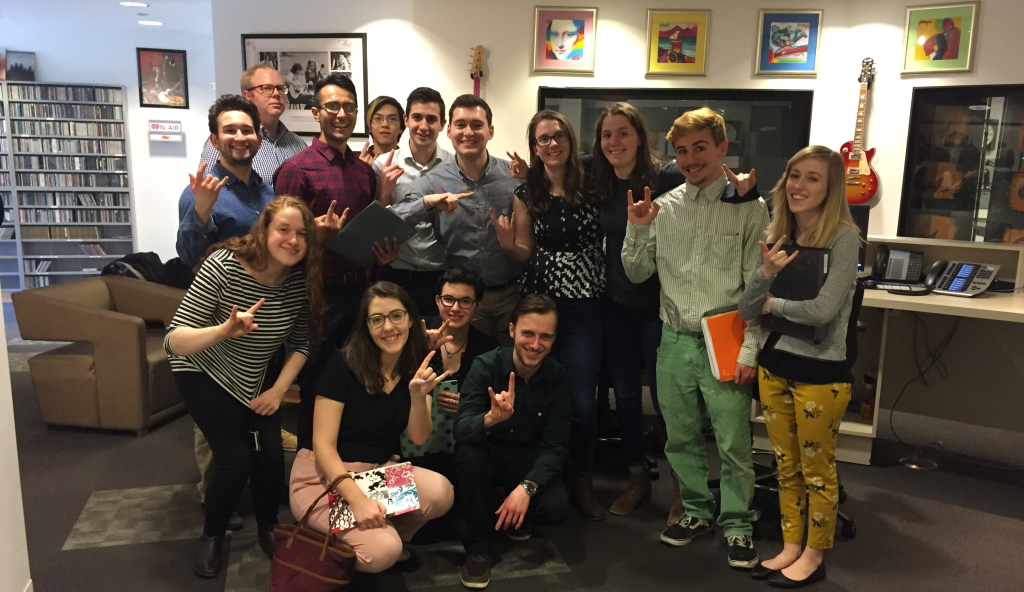
Diane: You referenced the station’s recent affiliation with Pacifica as part of your programming expansion, part of your rebuilding community connections. Can you talk more about that decision?
Andrew: Over the last couple of decades, the station has been more of a music station, by nature of there being a music industry program on campus. So, when I came in, being someone who has a background in broadcasting, I [thought] we needed to get more of this [news] programming on the air. We’ve been working with that over the past few years, developing our own original programming.
We have students who are doing a podcast with Oneonta Voices. I oversaw that for a couple years, producing that through classes; and the programming ended up being distributed through WONY; it would air as a broadcast and then also get distributed online as podcasts.
And that brings us to Pacifica. We obviously prefer to be creating our own original programming, though especially with COVID that programming dropped off. Original programming is difficult to produce, particularly when we’re running things with student volunteers. We don’t have a whole journalism program that has multiple classes where students can be churning out news broadcast content. So we wanted to start to fill out the schedule more with news and current affairs-based programming, using syndicated content from Pacifica.
And [we’re] also thinking about how we can better serve the community. For instance, what are programs that the community would benefit from, programs like Democracy Now, programs that they may already know, that would add value to the station, recognizable international programs distributed through WONY. That’s good for us but also good for the community, programs of very high quality [that] also deliver a perspective that really isn’t otherwise heard here through radio or television. We have only a couple of public broadcasters in the local area. There’s definitely room for various kinds of opinions, perspectives. So that’s the main attraction for Pacifica, to just help us with issues-based programming.
We’re still figuring out all the programming that we’ll be using. There are a few programs that we’ve been playing regularly, but we’re not yet making full use of our affiliation.
I want the students to be taking the lead on this, too. I could just go in and start putting programs into the automation computer, sure. But I actually want the students to be actively involved in what they’re choosing to play and when, and that’s a little bit of a slower process.
Diane: But that’s also good instruction. Even though you know you can do something, you step back and let the students do it. It may take longer and it may be a little more sloppy, but it’s still better.
WONY, SUNY Oneonta’s student-run station, can be heard at 90.9FM, live online at wonyfm.com, and on the Simple Radio app.
All photos used with permission of station manager Andrew Bottomley.
